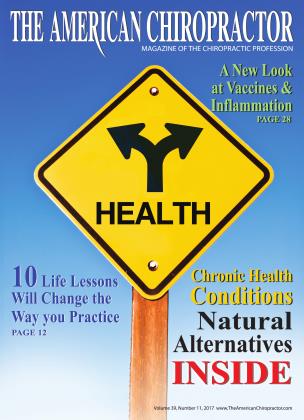Slowing the Progress of Immunosenescence
SUPPLEMENTATION
Jennifer Morganti
DC
The term immunosenescence was coined in the late 1960s by the late gerontological researcher, Dr. Roy Walford. The expression succinctly defines the progression of a declining immune system over time, which leads to the aging process and anticipated decline in health that is accepted as “nonnal” in both humans and animals.1 Because of immunosenescence, the elderly are vulnerable to serious infectious diseases and a poor response to vaccinations. For example, the 2012-2013 flu vaccination was reported to have only 9% effectiveness against influenza A in seniors over 65 years of age, versus 52% in adults under 65.2 Numerous reasons account for this weakened immune response, including a decline in haematopoietic stem cell activity and ability to produce B cells; a shrinking thymus, which results in lower T cell production; and telomere shortening.3
As the current life expectancy continues to increase, scientists are looking for ways to improve the quality of life in later years. The key may lie in the concept of immunosenescence. If the deterioration of the immune system is largely responsible for the aging process, then investing in immune supportive therapies could be fundamental to enhance longevity and health.
Augmenting the immune system should start with improving one’s lifestyle. Smoking, drinking alcohol, poor sleep habits, and an unhealthy diet can all suppress immune cell function and must be minimized, but can more be done to really supercharge the immune system and delay the degeneration process?
* * Augmenting the immune system should start with improving one’s lifestyle. 5 5
One exceptionally effective immune-enhancing nutrient is called rice bran arabinoxylan compound (RBAC), which is a natural polysaccharide composed of hemicellulose extract from rice bran modified by an enzyme derived from shiitake mushroom. Many in vitro and human studies have been conducted on RBAC that confirm its impact on the immune system; it consistently increases natural killer (NK) cell activity and significantly enhances B and T cell counts in individuals with compromised immune systems.4 RBAC is particularly unique because it is a proven immunomodulator, a term defined by one researcher as “an agent possessing a broad range of activity dependent upon the existing state of health and immunity in the individual host.”5
In one published clinical trial, the enzymatically treated rice bran was shown to increase NK cell activity in a dose-dependent manner up to a certain dosage. Twenty-four individuals took the compound at three different concentrations: 15, 30, 45 mg/ kg/day. The activity of NK cells was measured after taking the extract for one week, one month, and two months. The results
of the study showed that all doses increased the activity of NK cells, but the larger the dose, the quicker the NK activity increased. After two months of treatment, NK activity peaked at the same level regardless of the dosage. This study proved valuable in making dosage recommendations; immunocompromised persons should take a high initial dose of the supplement to boost NK activity quickly. After a few weeks, a high level of NK activity could be maintained long term on a lower maintenance-dose level.6
A more recent study at the University of Miami included 20 healthy individuals and determined that immune activity starts to increase within as little as two days, and becomes significant after one week of taking RBAC. This study also demonstrated the bidirectional immune marker effects that are expected with a proper immunomodulator.7
So how does this boost in immune activity translate into clinical results? Several clinical studies and many reported case studies have demonstrated a significant positive clinical effect. One specific clinical trial showed that RBAC helped improve the quality of life for people undergoing chemotherapy for breast cancer. In this study, the people in the control group received only chemo and were found to have poor appetites with subsequent weight loss, extreme fatigue, nausea, and significant hair loss. The group taking RBAC in conjunction with chemo experienced improved appetites, reduced fatigue and nausea, and significantly less hair loss.8
RBAC has been the subject of dozens of published studies to date, and a multitude of case studies have been collected from health practitioners around the world.
References:
1. Immunity & Ageing 2005, 2:7
2. http://www.cdc.gov/ftu/about/season/flu-season-2012-2013. htm
3. EMBO reports (2007) 8,220-223
4. Townsend Letterfor Doctors and Patients January 2000,58-62
5. Functional Foods in Health and Disease 2012, 2(7):265-279
6. Int J Immunotherapy 14(2) 89-99, 1998
7. Functional Foods in Health and Disease 2012, 2(7):265-279
8. The Professional Medical Journal 2013, 20(1):013-016
Doctor Jennifer Morganti earned her naturopathic medicaldegreefrom Bastyr University in Seattle, WA. Over the past 15 years she has been working in the natural products industry assisting companies in a variety of capacities and currently serves as a medical consultant to nutraceutical companies. Previously she was Director of Education for Needs.com and had
acted as a spokesperson for specific products that she is passionate about, reaching out to consumers through writing, speaking at conferences and health fairs, television, and hundreds of radio interviews. Doctor Jen is deeply committed to health education and believes that understanding the benefits of natural medicine will empower you to take control of your health. The key to health success is to find the diet, supplements and exercise that you can sustain it for the rest of your life. Making small, easy changes consistently over the course of time add up to significant, permanent health benefits. Contact info: 941-786-393purenutrition ajnsn.com
 View Full Issue
View Full Issue






